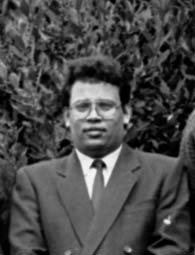Personal tools
News from ICTP 106 - Commentary

A former ICTP Diploma student calls on ICTP to help improve the climate for science in developing countries.
New Course of Action
For nearly 40 years, ICTP has
worked diligently--and successfully--in cultivating the talents
of scientists from the developing world.
The Centre's achievements are remarkable and indeed worthy of
praise. However, if we examine the status of scientists in some
developing countries, we find that, despite ICTP's efforts, neither
their working conditions nor their career prospects have improved
greatly.
ICTP should not be criticised for these shortcomings. The Centre's
scientific and administrative staff have done their best to advance
the institution's lofty goals. However, the results have proven
less successful than Abdus Salam envisioned four decades ago.
ICTP has concentrated its efforts on assisting promising young
scientists in developing countries. The Centre has tried to nurture
their talents so that they could return home to help their countries.
While this strategy makes sense at a certain level, it is based
on a blueprint for action that can only be achieved at a very
slow pace.
Let us take the example of the ICTP Diploma Programme, which is
one of the Centre's most important training activities.
The Diploma Programme began 12 years ago. Over the years, ICTP
has spent a great deal of time, effort and money to provide advanced
academic training to about 400 young scientists in the fields
of high energy physics, condensed matter physics and mathematics.
As a graduate of the Diploma Programme, I experienced first-hand
the staff's skill and dedication.

Khalil Shaaban Said as Diploma Programme student in 1991
Most Diploma Programme students go on to earn Ph.D. degrees
and many are appointed to postdoctorate positions at excellent
universities in Europe and North America. Yet, when they return
to their home countries to teach the next generation of students,
many find the situation so fraught with problems and disappointments
that they soon decide to pursue their careers elsewhere.
Many ICTP Diploma Programme students from Arab countries, for
instance, have sought to work in Persian Gulf countries. As a
result, it seems as if these countries have benefitted from ICTP's
efforts. Yet, if history is any guide, most of these students
will choose to leave the region for teaching and research posts
elsewhere.
ICTP Diploma Programme students cannot be blamed for their unwillingness
to stay home. It is not possible to ask them to remain in countries
within their regions when earning salaries that they cannot comfortably
live on. Moreover, most do not have access to work environments
that would allow them to do world class research; nor have they
been given positions that would facilitate their career advancement.
In such settings, young professors find themselves able to teach
young students but unable to do research. As a result, many of
ICTP's Diploma Programme students often spend as much time as
possible abroad even if they do not leave their home countries
permanently. I know. I am one who has taken this career path.
Although the situation for scientists in some Third World countries
is not much different than it was 40 years ago, I remain stubbornly
optimistic.
Yet, to correct this situation, ICTP should begin to work closely
with other organisations throughout the developing world to help
alter societies' view of science and to convince governments of
the benefits that can be derived from providing greater support
to their scientists and scientific institutions.
ICTP has made a significant difference in the lives of thousands
of scientists from the developing world over the past 40 years.
What I am suggesting now is that ICTP develop mechanisms for encouraging
the societies of the Centre's visitors to become more science-friendly.
Specifically, I propose ICTP create branches in the Arab world
and other developing regions to promote research activities that
help scientists remain in their own countries.
Such endeavours, I believe, will ultimately advance ICTP's most
cherished goal, which is to build scientific expertise and capacity
in countries throughout the developing world.
In a sense, this new course of action would not be new at all.
Instead it would parallel the broad strategic vision that Abdus
Salam had for ICTP when he first launched this venerable institution
in 1964.
Khalil Shaaban Said
Associate Professor
Department of Physics
Ain Shams University, Cairo, Egypt
On Leave 2003, University of Durham, UK